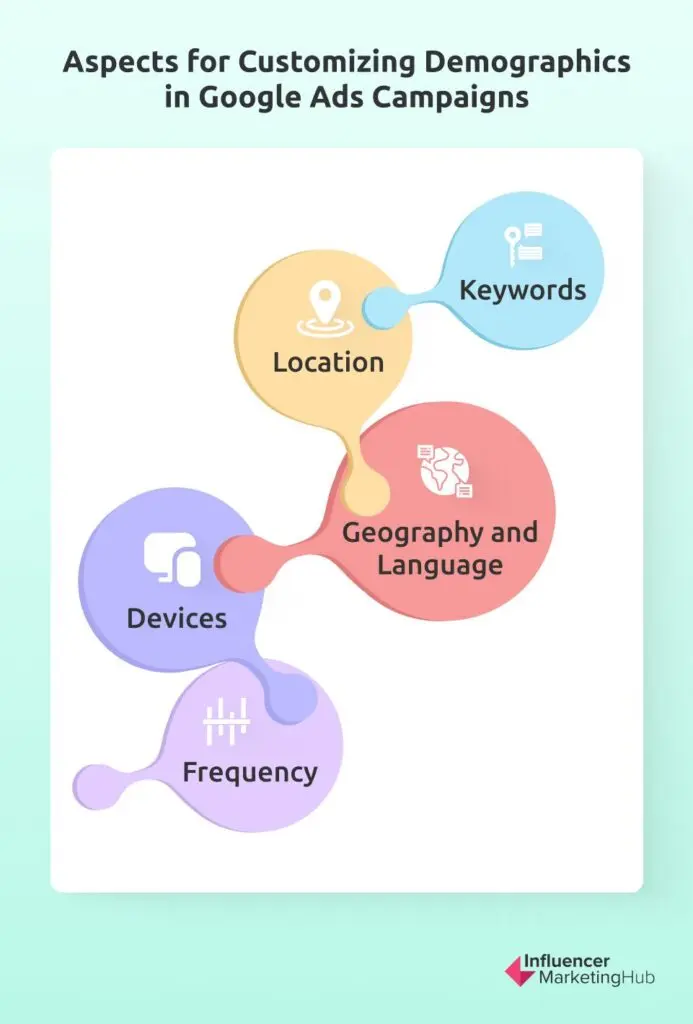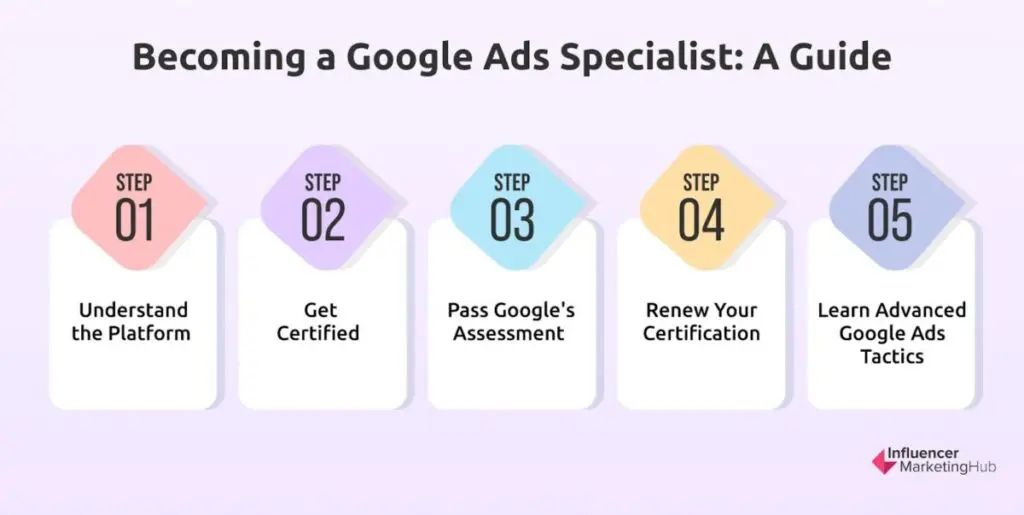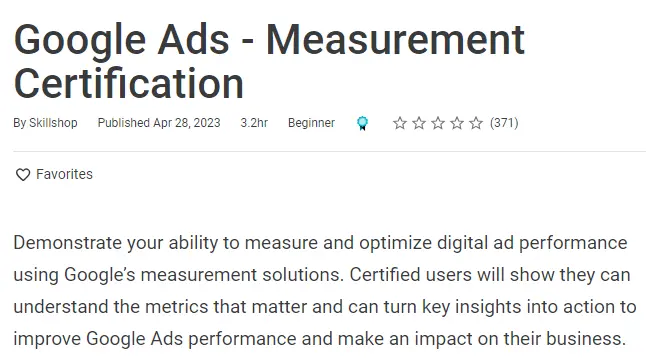For more than the past two decades, Google has been the leader in the online search market globally. The search engine has trumped its competitors in everything from traffic and advertising volume to revenue. Google's ad revenue in the US has grown exponentially from $41.8 billion in 2019 to $81.04 in 2024.
But where does Google get this revenue from? A significant part of Google's income comes from Google Ads, formerly known as Google AdWords.
The current competitive landscape makes it essential for businesses to make Google Ads a part of their marketing strategy. That's precisely what they're doing. A Tinuiti research found that spending on Google ads increased by 17% from 2022 to 2023.
As the spending on Google Ads is increasing, so is the need for Google ads specialists. Whether you plan to learn Google Ads to improve your marketing skills at your own business or plan to offer marketing services to clients, this guide will help you get started.
What Is Google Ads?
Let's start with the simple stuff. Google Ads is an online advertising platform that businesses use to display their ads on Google's search results pages. It mainly works on a pay-per-click (PPC) model, meaning the advertiser pays each time someone clicks on their ad.
Google Ads also serves as a search engine marketing (SEM) tool, as it allows businesses to bid on keywords that will make their ads appear when people search for those terms on Google. The higher the bid, the more likely the ad will show up in front of potential customers.
Besides text format, Google Ads also appear as video ads, YouTube ads, and banner ads. These ads do not only appear on Google; you can also display them on Google's partner websites.
Why Is Google Ads Important for Businesses
First, Google Ads allows businesses to reach a larger audience. Around 91.47% of all web search takes place on Google. So, if you display your ads on the search engine, you're basically catering to all your potential audience.
Google Ads also lets you target specific demographics. Here are some aspects that you can customize when creating your ad campaign:
-
Keywords: You can only make your ads show up if people search for specific terms. This way, you only target people who are already interested in what you have to offer.
-
Location: Besides the Google search results page, the ads can also be shown on websites that are in Google's Display Networks. It's up to you to select the location.
-
Geography and Language: Select the geographical location, language, and age group of your target audience.
-
Devices: Maybe you only want to show your ads on the desktop. Google Ads lets you customize this. You can decide when to show ads on a certain device and which ads to show.
-
Frequency: Set the frequency of ads displayed based on your preferences. You may show them only on a certain day or for specific hours daily.
Online advertisements can be expensive. But Google Ads give you full control over your spending. Since there's no minimum, you can start with a small budget and increase it gradually as you begin to see results. You only have to pay when your ad gets clicked.
For the best part, Google has a built-in analytics dashboard that shows you valuable data on which to base your decisions. For example, you can gauge your audience's shopping habits. Then, you may center your marketing campaigns around these patterns.
What Is a Google Ads Specialist?
A Google Ads specialist or expert is someone who is well-versed in Google Ads and has experience in creating successful campaigns. They may work full-time for a company or as a freelancer.
What Does a Google Ads Specialist Do?
A Google Ads specialist performs all tasks related to creating and managing Google Ads campaigns. Here are some of their roles and responsibilities.
-
Monitoring Performance: If there's already a campaign running, a Google Ads specialists would evaluate its performance. They would use different metrics like clicks, conversions, impressions, click-through rate, and cost to analyze the results.
-
Reviewing Targeting: You can't have your Google Ads running out in the wild. They need to be laser-focused on a particular audience. A Google Ads specialist reviews the targeting settings and makes necessary changes to ensure the ads are always reaching the right people.
-
Launching Campaigns: Google Ads specialists also launch new campaigns from scratch. They research keywords, create ad copies, set bids, and budgets, and do everything to make the campaign successful.
Apart from these core duties, Google Ads experts also optimize campaigns. For example, they may adjust the targeting if the initial targeting isn't working as expected.
Similarly, they may use negative keywords to filter out unwanted clicks. For example, an ad campaign for "women's shoes" may attract clicks from people searching for "men's shoes." In such cases, the Google Ads specialist would add "men" as a negative keyword.
Google Ads specialists also have to report on campaigns. They share the data with clients and suggest ways to improve campaign performance. In an in-house team, the specialist will work with other team members and departments, such as marketing and design, to create successful future campaigns.
How to Become a Google Ads Specialist?
Now that you have a little know-how of what a Google Ads expert does, let's get into how you can become one.
Step 1: Understand the Platform
The Google Ads platform will be your workshop. So, you should know everything possible about it.
Familiarize yourself with different components of the platform. For example, over the years, Google has introduced new types of ads that businesses can show their audiences. These include:
- Responsive search ads
- Performance Max ads
- Display ads
- App ads
- Discovery ads
- Shopping ads
- Smart campaigns
Learn about each of these ad types and how they can be used for different businesses and goals.
Similarly, Google Ads can serve different purposes. Some of them are lead generation, online sales, brand awareness, and offline sales. Learn how you can use the platform to achieve these objectives.
The good news is that Google has a lot of resources to help you. For example, Google's Lead Generation Playbook provides insights on how to use digital ads to gather leads.
Google also shares case studies that budding Google Ads experts can dissect and learn from. For example, app ads are relatively newer and have a lot of untapped potential. Google has a resource on how you can grow your app business with ads.
Step 2: Get Certified
Learning from online resources and videos is a good place to start. But you'll need some sort of certification to actually land clients and build credibility.
Google offers Google Ads certifications, which are professional accreditations to demonstrate your proficiency in all aspects of Google Ads. Getting certified means that Google recognizes you as a Google Ads specialist.
Google's certification helps both types of SEO experts, those working individually and the ones working for a business. For the latter, the Google Ads certification paves way for becoming a Google Partner.
If you're a beginner, you can take the Measurement Certification by Google, which teaches you the basics of Google Ads optimization and diagnostic assessment. In 2024, AI is everywhere, even in advertisements.
So, if you want to be deemed a specialist, you'll have to do a little more than just learn traditional Google Ads tactics. Google has an AI-powered Performance Ads Certification to prepare you for using cross-channel AI solutions in your campaigns.
Google also has individual certifications for ad types, such as offline sales, display ads, app ads, and video ads. You can find all these certifications in Google's Skill Shop.
Step 3: Pass Google's Assessment
Once you finish your certifications, you'll be all set to take Google's assessment. The passing score is 80%, and you'll have 75 minutes to answer all questions. If you fail the first time, you can retake the assessment after 24 hours.
When you start the timer for your assessment, you won't be able to pause or stop it, so make sure you are fully prepared before taking the assessment.
Go through everything you learned in the course before taking the test. If you're studying for a specific product area, such as video ads, familiarize yourself with its use cases and relevant metrics.
Step 4: Renew Your Certification
Google Ads certifications expire after 12 months. Here's what Google says:
''You can refer to yourself as "certified" as long as your certification remains in effect. After the expiration date, you won't be able to refer to yourself as "certified" until you pass the assessments again.''
The reason for annual reassessments is that Google keeps changing its tools and algorithms. New ones come out every year, and Google Ads experts must be familiar with them. By retaking the assessments, you'll stay up-to-date and maintain your expertise in using Google Ads.
Step 5: Learn Advanced Google Ads Tactics
For you to be a ''specialist,'' you must learn more than just the basics. Update your knowledge with advanced Google Ads tactics and tools.
Here are a few recommendations.
Use Remarketing Lists For Search Ads (RLSAs)
Remarketing lists for search ads, or RLSAs, are a type of audience targeting where you can show your ads to people who previously visited your website. Basically, you study their behavior and then tailor your targeting and bidding options around these insights.
One way to do this is to specifically target people who spend more than the average purchase value on your site. These people have already spent money on your products. So, when they see your ad on top of the search results, they're likely to click on them rather than scrolling through your competitors' product selection.
Let's say you're an online skincare brand. The average order value in your store is $50. But there's a group of customers that spend around $100 to $120.
Set up a Google Ads campaign targeting these customers. Bid on competitor keywords using RLSAs so that the ad is only displayed when the people in your list search for that term.
Leverage Social Media Audiences
Google Ads don't have to be used in exclusion. You can merge them with your social media campaigns and target people who have interacted with your brand on social media.
Case Study: Bombas, an e-commerce sock company, used Facebook's Lookalike Audiences for its Pride campaign. The use of Facebook resulted in a 33% lift in conversions and 1.2x increase in return on ad spend, which was 65% higher than regular campaigns.
Google Ads specialists can use this case study as inspiration. Let's say you want to identify new potential buyers and then target them using Google Ads. You can use the social media platform to target new audiences and then retarget them through Google Ads to increase the effectiveness of your campaigns.
Experiment With Different Ad Formats
Being a specialist means you should know the ins and outs of Google Ads like the back of your hand. Don't limit yourself to one ad format.
Instead, experiment with different ad formats and master all of them. The type of ads you use for various campaigns, audiences, business use cases, or clients will vary. So, you should know what each ad format offers and how to make the most out of it.
Step 6: Keep Up With Industry Trends
It's not just Google's own updates that you have to keep an eye on. You also need to be aware of the latest digital marketing trends and how they affect Google Ads.
For instance, voice search is becoming a norm, which means people are speaking to Google rather than typing their queries. So, the keywords need to be more conversational. Long-tail keywords and phrases are also more important, as people tend to use longer search queries when using voice search.
Similarly, AI is also making a significant impact on digital marketing. Google's AI-powered smart bidding strategies can help you optimize your campaigns.
Patrick Gilbert, the COO at AdVenture Media, says, ''Automation is all about unlocking the power of predicted conversion rates, which simply means treating people the way they should be treated: as individuals with unique preferences, tastes, and desires.'' The use of AI in Google Ads can help businesses personalize their strategies at scale.
Here are some ways to keep up with industry trends:
- Follow industry forums, news sites, and blogs.
- Participate in webinars and seminars.
- Attend conferences to learn from the best in business.
- Keep an eye on Google's core updates and algorithm changes.
- Follow Google Ads experts and seasoned marketers on X to get insights and tips. You can also follow Google Ads’ official X account to get tips from the team itself.
Step 7: Get Practical Experience
Knowing everything in theory isn't enough. You also have to get hands-on experience with Google Ads.
One of the best ways to get practical experience is by managing a small campaign for your own business or a friend's venture. Manage an actual campaign and optimize it. Check the analytics regularly and tweak your campaign accordingly.
Experiment with different targeting options and ad formats. If you don't have a business of your own, reach out to non-profit organizations and offer them your services for free.
You can also intern at a Google Ads agency to gain experience. Since you won't be working alone, there's a lower likelihood of taking the wrong steps and making costly mistakes. Once you think you have learned enough, you can move on to managing campaigns for clients and building your portfolio.
If you're already working in digital marketing and want to branch out your skill set to include Google Ads, ask your employer if you can take on more responsibility for managing their Google Ads campaigns. Again, work with a mentor until you have enough confidence and experience to manage campaigns on your own.
Step 8: Hone Relevant Skills
Mastery of the Google Ads platform is just one part of the job. Another is having relevant transferable skills, such as:
- Attention to Detail: We've already talked about how you need to retarget and optimize campaigns. That's only possible if you keep an eye on everything that's happening in the campaign. You also need to be attentive to trending keywords and industry trends.
- Budgeting: Google Ads campaigns have a specific budget, and it's your job to make the most out of every penny. You should know how to ensure maximum ROI for your clients.
- Data Analysis: It won't be wrong to say that data drives advertisement campaigns. The data tells you which keywords or demographics to target. Similarly, the data from your analytics dashboard further provides pointers for which direction the campaign needs to take. So, you must have strong analytical skills.
Employment Opportunities for Google Ads Specialists
After following the steps mentioned in this guide, you can look for opportunities to work as a Google Ads Specialist. Here are some places where you're needed.
Marketing Agencies
Marketing agencies provide a range of services from traditional marketing to digital marketing. These may include SEO, email marketing, social media marketing, and Google Ads. The last part is where you come in.
As a Google Ads specialist at a marketing agency, you will:
- Design and inform ad strategies for clients
- Handle progress reports
- Perform A/B testing with keywords and ad placements
- Run retargeting campaigns
- Optimize overall campaign performance
In-House Marketing Teams
Most enterprises have in-house marketing teams to look after all their digital marketing strategies. If you have sufficient experience, you can find a place at such a company.
Unlike marketing agencies, where you'll handle multiple clients, as a part of an in-house marketing team, you'll only work on the company's campaigns.
According to Glassdoor, you can earn $49,000 to $88,000 on average per year as a Google Ads specialist. The salary range differs based on your years of experience and where you work. For example, Mobility Quests pays $50,000 to $82,000 to its Google Ads specialists.
Startups and small companies may not be able to pay as much. But if you're just starting out, you can build your experience and portfolio by working with them.
Your earnings may also differ based on your geographical location. For example, the average annual salary in Sunnyvale, CA, is $69,793, which is much higher than most other areas. Cities with a happening tech scene and abundant business centers will likely have more job opportunities and higher salary ranges for Google Ads specialists.
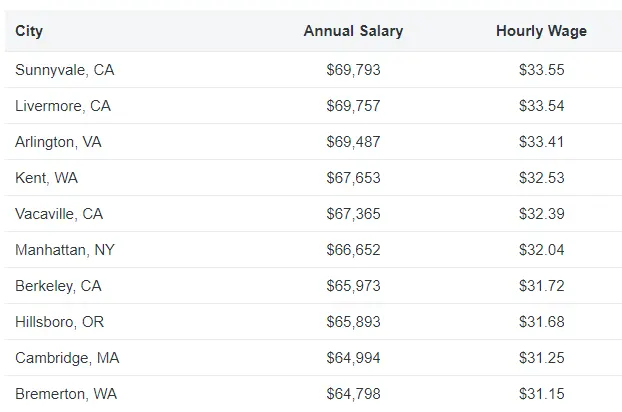
Salaries for Google ad specialists based on cities
Freelancing
If you don't want to work full-time, you can choose to be a freelancer. You may start at an hourly rate until you build your reputation. At this stage, you must develop your portfolio and gather testimonials from satisfied clients to attract more projects.
Upwork is an excellent place to start. Google Ads experts on the platform charge $15 to $40 per hour on average. As a beginner, you can start with these rates.
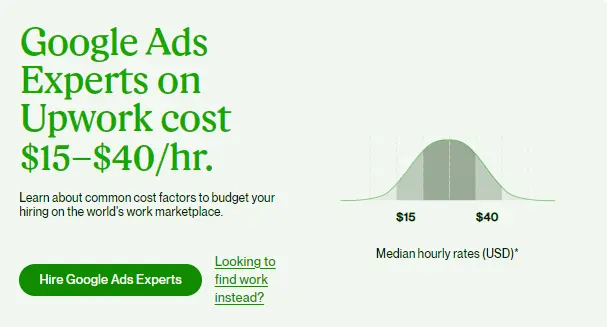
Cost of hiring a Google Ads expert on Upwork
Once you gather enough positive reviews, you can raise your hourly rate. Some experts are charging as high as $105 to $225. The rates will ultimately depend on your expertise and the projects you take on.
Conclusion
Starting your journey as a Google Ads specialist may seem daunting, especially with the constantly evolving landscape of online advertising. However, it doesn't have to be hard to get started if you follow the right trajectory.
Start with a basic understanding of the platform. Then, get certified by Google and pass the assessment. Renew your certification every year, too.
After that, it's on you to hone your skills, whether Google Ads-related or transferrable ones. Learn from industry experts and Google's case studies or resources. Also, keep up with any changes Google makes in its Ads or search platform.
Once you're confident in your Google Ads skills, you can explore different career options such as working for an agency, becoming a freelancer, or working in house for a business. Our pro tip is that your learning should never stop; you're only a specialist if you know everything that's new in the game.

